Best Omnichannel Messaging Platform Shortlist
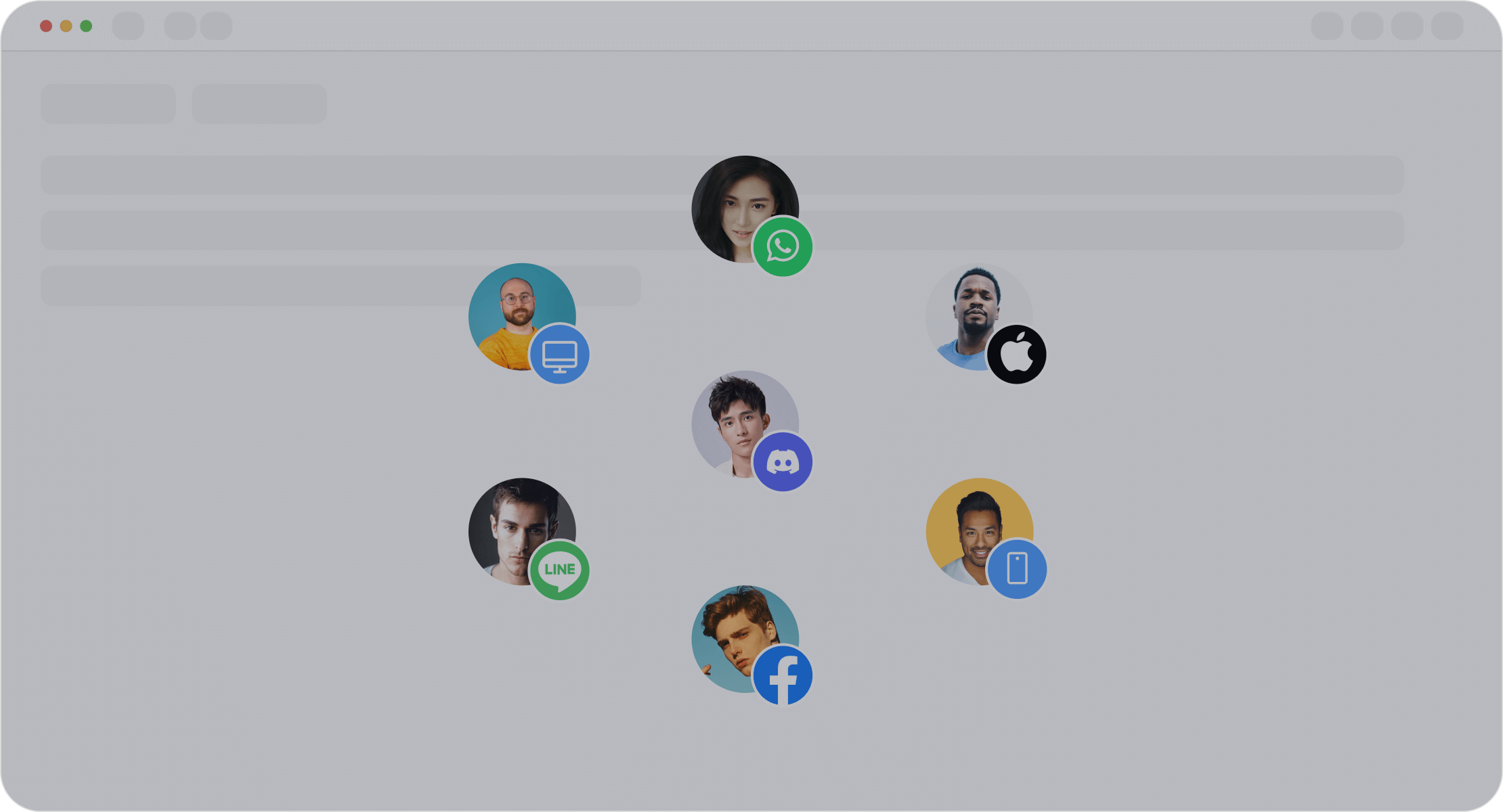
Choosing the right omnichannel messaging software is key for your business. It helps you manage messaging across multiple communication channels. To help you decide, here are our top picks for creating a seamless customer experience.
Top 3 Quick Picks 🚀
- Zendesk: Best for scaling customer support.
- Gorgias: Best for e-commerce brands.
- Sobot: Best all-in-one solution for growing businesses.
The market for this technology is growing fast. Businesses see the value in unified messaging. Better customer engagement across all channels drives this growth. An omnichannel messaging platform improves the customer experience. This omnichannel messaging software helps businesses connect with people on their preferred channels. The best omnichannel platform uses tools like the Sobot AI and the Sobot call center for better engagement and messaging.
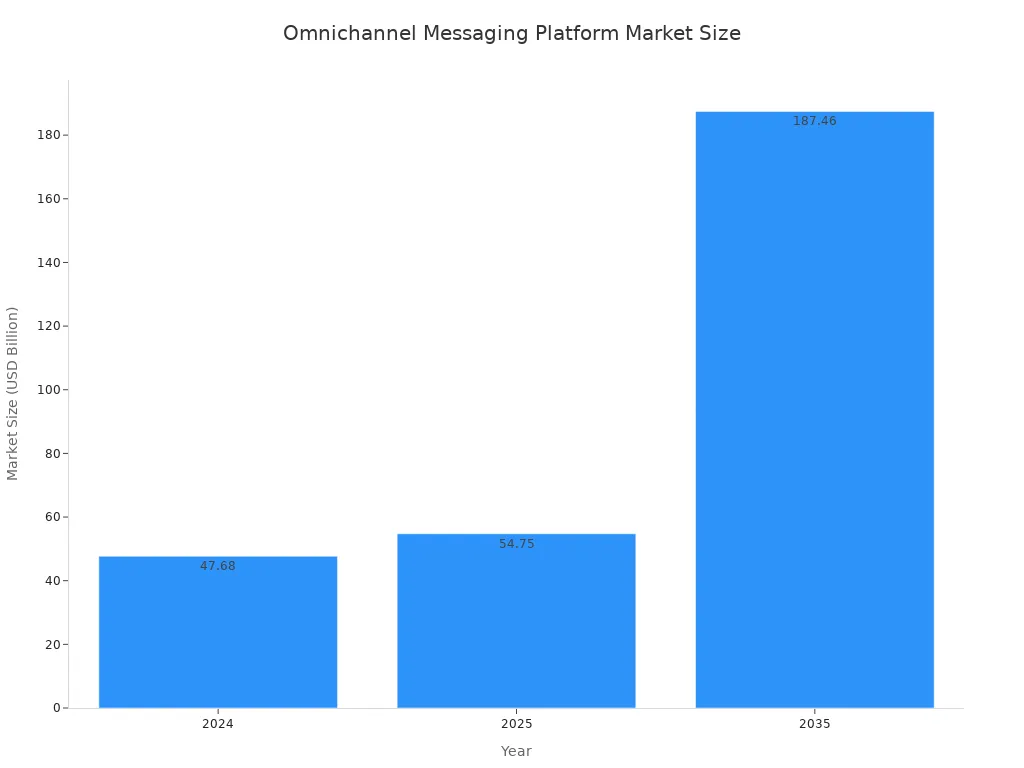
Omnichannel Messaging Platform Comparison Table
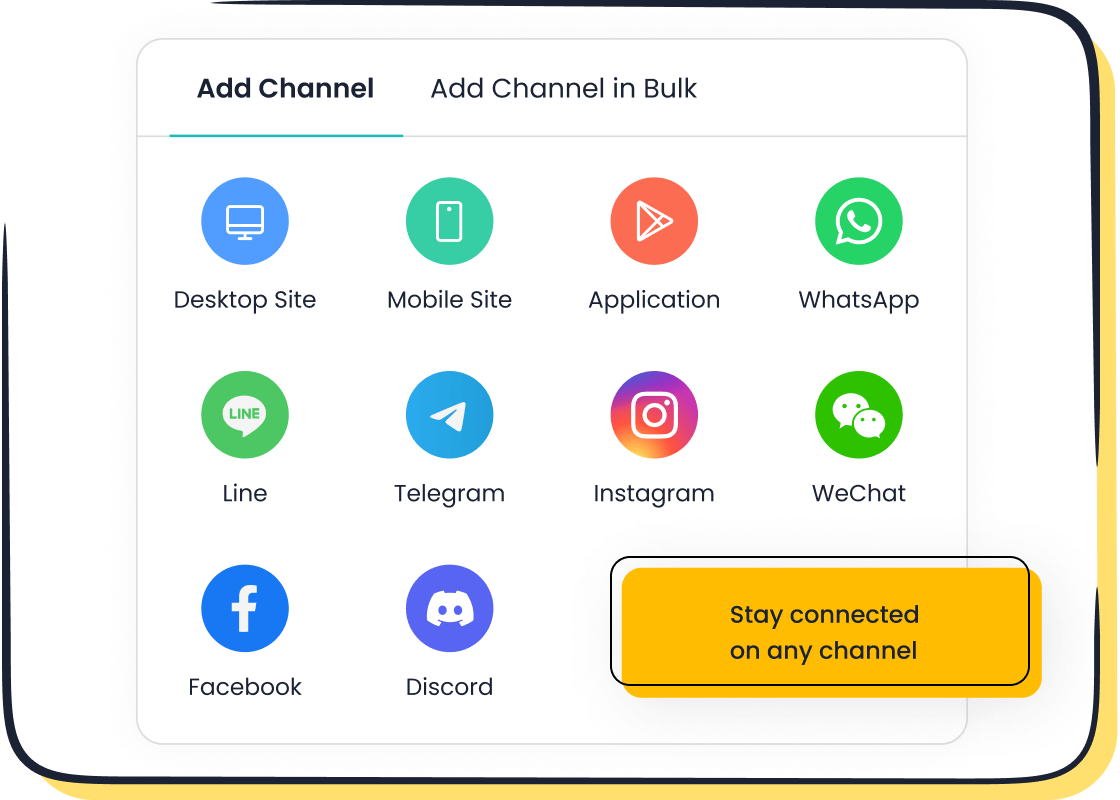
To find the right omnichannel messaging software for your company, you need to compare the top options. This table helps you evaluate each customer messaging platform side-by-side. You can see what each tool is best for, its main features, and how much it costs. This information makes your decision easier. Good omnichannel messaging software unifies your customer communication across multiple communication channels.
This comparison will help you understand how different omnichannel platforms handle customer engagement. Some focus on AI-driven automation, while others excel at live chat and chatbots for real-time support. The right choice improves your customer experience platform and supports your marketing automation goals. Businesses can use this data to select a solution that offers personalized messaging and boosts customer engagement. Effective messaging across all channels is key to growth. This omnichannel messaging software comparison simplifies the process of enhancing your customer communication over multiple communication channels.
| Platform | Best For | Key Features | Starting Price |
|---|---|---|---|
| Zendesk | Scaling customer support | Unified inbox, AI-powered routing, real-time analytics, built-in CRM | $49/agent/month |
| Intercom | Customer engagement & onboarding | Custom bots, product tours, targeted messaging, live chat | $39/month |
| Gorgias | E-commerce brands | Deep Shopify integration, social media management, automation rules | $50/month |
| Sobot | Growing businesses (All-in-one) | Unified inbox, AI Chatbot, WhatsApp BSP, Ticketing System | Contact for Quote |
| Freshdesk | Affordable omnichannel messaging | AI-powered chatbots, contextual messaging, campaign management | $15/agent/month |
| HubSpot | Businesses using HubSpot CRM | Ticket automation, knowledge base, customer feedback surveys | $45/month |
| Tidio | Small businesses & startups | Free plan, live chat, chatbots, email marketing automation | $29/month |
| Twilio Flex | Highly custom solutions | Fully customizable UI, voice/SMS/chat support, workforce management | $1/active user hour |
| Nextiva | Unifying business communications | VoIP, team messaging, video conferencing, CRM integration | $23.95/user/month |
| Front | Collaborative team inboxes | Shared email inboxes, automated workflows, integrations | $19/user/month |
This chart gives you a quick visual of how starting prices compare for some of the top omnichannel platforms.
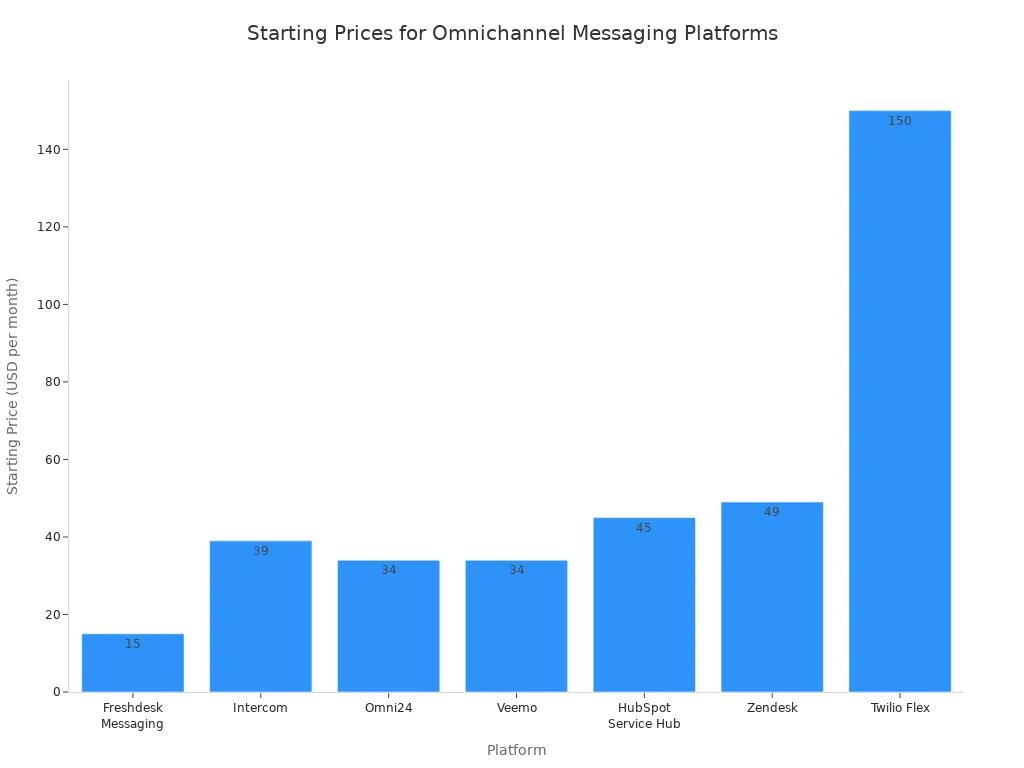
Choosing the best omnichannel messaging software depends on your specific needs. Consider your primary use case, like customer support or personalized marketing. Your budget and the need for personalization across multiple communication channels will also guide your choice.
1. Zendesk
Zendesk is a powerful omnichannel messaging software designed for businesses that need to scale their customer support operations. It helps you manage customer communication across multiple communication channels from a single, unified workspace. This platform is known for its robust features that support growing teams.
Key Features
Zendesk provides a suite of tools to enhance customer engagement. Its AI-driven automation helps your team work more efficiently. You can use its intelligent routing to direct customer messaging to the right agent. For example, the system can detect a customer's intent, like a damaged item report, and automatically send it to the correct team.
- Intelligent Triage: Automatically analyzes messages for intent, language, and sentiment to route tickets effectively.
- Advanced Bot Automation: You can build bots to handle common questions and gather information, freeing up your live agents.
- Unified Workflow Builder: This tool lets you create automated workflows for ticket routing, prioritization, and escalation across different channels.
- AI-Powered Agent Assistance: Provides agents with real-time suggestions, relevant articles, and macros to speed up resolution times.
Pros & Cons
Pros:
- Highly scalable for growing businesses.
- Advanced reporting and analytics.
- Extensive integrations with other apps.
Cons:
- Can be expensive for small businesses.
- May have a steep learning curve for new users.
Omnichannel Customer Support Pricing
Zendesk offers several pricing plans for its omnichannel customer support suite. The plans are designed to fit different team sizes and needs, from small teams to large enterprises. Your choice depends on the features you require for your personalized messaging and marketing automation strategies.
| Plan | Price (per agent/month) |
|---|---|
| Suite Team | $55 |
| Suite Growth | $89 |
| Suite Professional | $115 |
The pricing structure allows businesses to select a plan that aligns with their budget and growth trajectory.
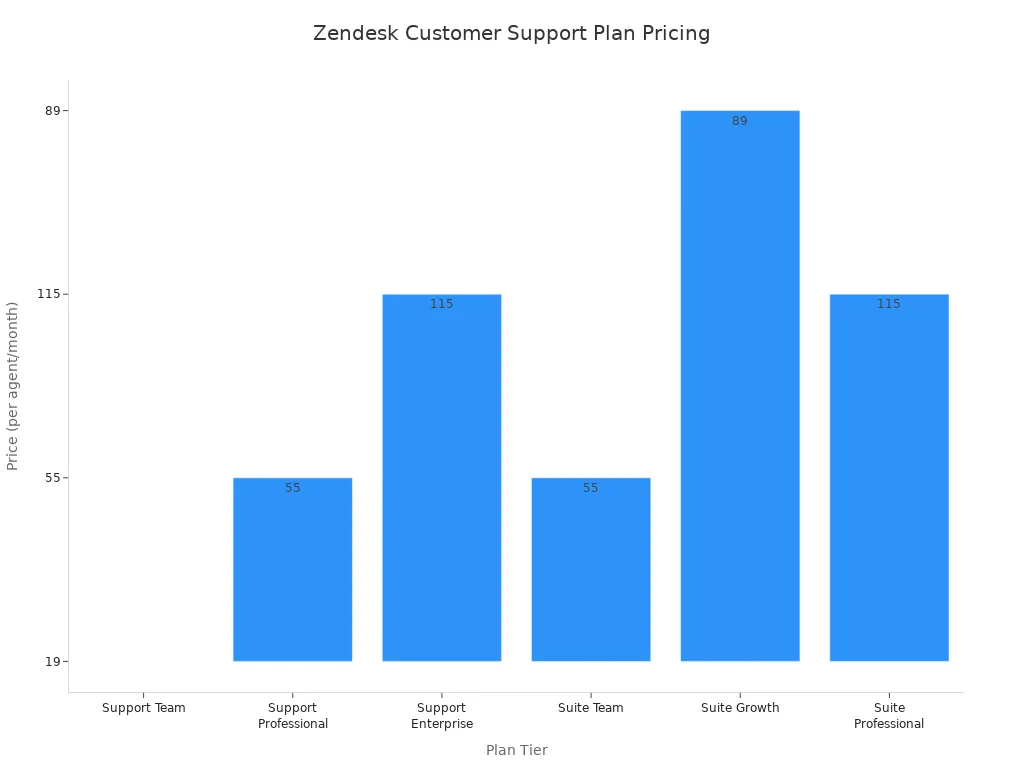
This omnichannel messaging software provides the tools needed for effective customer engagement and personalization across multiple communication channels. The right plan gives you access to features that support your marketing automation and customer communication goals.
2. Intercom
Intercom is an omnichannel messaging software that helps businesses build better customer relationships through personalized, messenger-based experiences. You can use it for live support, customer engagement, and marketing automation. It excels at creating interactive and personalized customer communication across multiple communication channels.
Key Features
Intercom offers powerful tools to improve your customer messaging. Its proactive support features guide users through your product, reducing confusion. The platform uses AI-driven automation to handle common questions, which frees up your team. This real-time support enhances the user experience.
- AI-Powered Bots: Intercom's bots, including the Fin AI Agent, provide instant answers from your knowledge base. They automate tasks like collecting customer info and routing queries.
- Proactive Guidance: You can trigger automated messaging in the chat at key moments. This helps users navigate your software and complete tasks independently.
- Seamless Onboarding: The platform guides new users with checklists and tasks directly within the chat, creating a smooth onboarding experience.
Pros & Cons
Pros:
- Excellent for proactive customer engagement and user onboarding.
- Powerful bot and automation capabilities.
- Clean and user-friendly interface for both agents and customers.
Cons:
- Pricing can be high for businesses with many support agents.
- Some advanced features are only available on higher-tier plans.
Pricing
Intercom’s pricing is seat-based, with different plans for various business sizes. The plans offer different levels of features for your messaging and marketing automation needs. Businesses can choose a plan that fits their team size and goals for personalization.
| Feature | Essential Plan | Advanced Plan | Expert Plan |
|---|---|---|---|
| Monthly Price (Annual) | $29 per seat/mo | $85 per seat/mo | $132 per seat/mo |
| Best For | Individuals & Startups | Growing Support Teams | Large & Enterprise Teams |
| Fin AI Agent | $0.99 per resolution | $0.99 per resolution | $0.99 per resolution |
| Shared Inbox | Included | Included | Included |
| Help Center | Public Only | Public, Private & Multilingual | Multiple Help Centers |
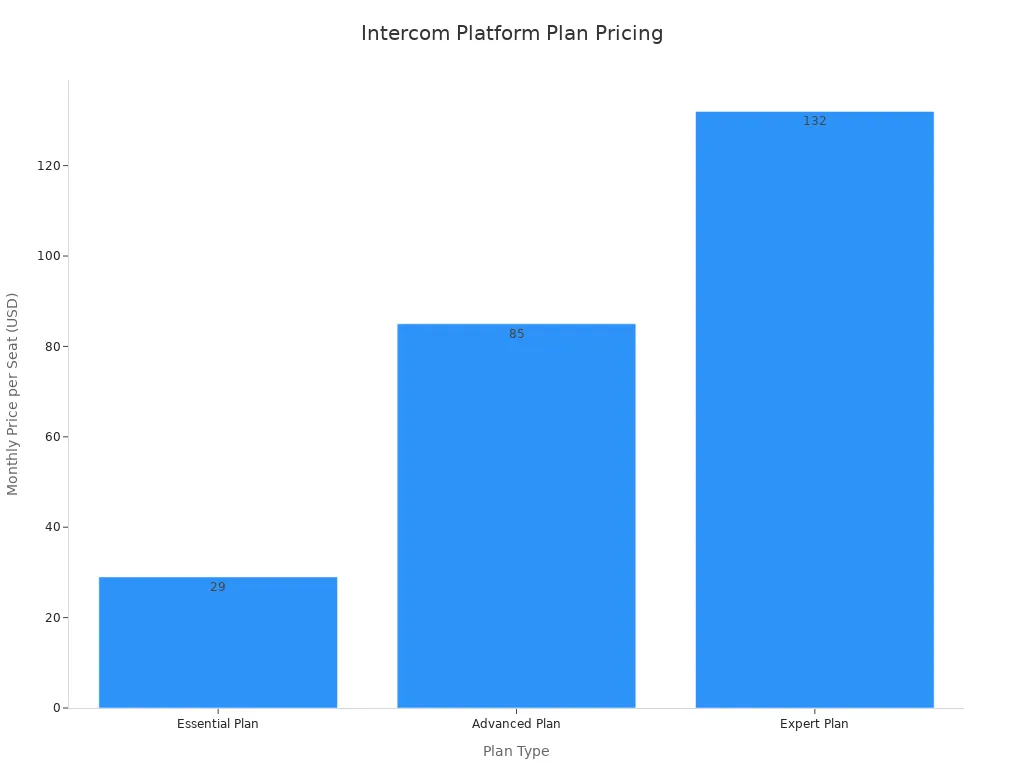
You can save money by choosing annual billing. Keep in mind that there are extra costs. The Fin AI Agent costs $0.99 per resolution, and outbound messaging on channels like SMS and WhatsApp has per-message fees. This omnichannel messaging software provides a robust platform for live, personalized customer communication across multiple communication channels.
3. Gorgias
An omnichannel messaging software like Gorgias is built specifically for e-commerce businesses. It centralizes your customer communication from multiple communication channels into one dashboard. This helps you manage support requests from email, live chat, and social media efficiently. The platform's main goal is to improve customer engagement and streamline support for online stores.
Key Features
Gorgias offers features designed to help e-commerce brands provide excellent customer service. The platform integrates deeply with major e-commerce platforms, allowing your agents to see customer order history right next to their support ticket. This context helps create a more personalized messaging experience.
Key features include:
- Deep E-commerce Integration: Gorgias connects directly with platforms like Shopify, BigCommerce, and Magento. This allows agents to perform actions like issuing refunds or updating orders without leaving the helpdesk.
- Centralized Operations: It brings all your support channels, including email, live chat, and social media, into a single view.
- Automation Tools: You can use rules and macros (canned responses) to automate repetitive tasks, such as tagging tickets or sending standard replies. This improves your team's efficiency.
| Platform | Specific Integrations/Functionality |
|---|---|
| Shopify | Issue refunds, update orders, respond faster directly from the help desk. |
| Magento | Supported, but with limited functionality compared to Shopify. |
Pros & Cons
Pros:
- Excellent for e-commerce businesses with deep Shopify integration.
- Unlimited users on most plans, so you don't pay per agent.
- Centralizes customer messaging from various channels.
Cons:
- Ticket-based pricing can lead to unpredictable costs, especially during peak seasons.
- Advanced AI and marketing automation features often require expensive add-ons.
Pricing
Gorgias uses a ticket-based pricing model. Your cost depends on the number of "billable tickets" your team handles each month. A billable ticket is any conversation that gets a reply. This model can be tricky for businesses with fluctuating support volumes. While plans offer unlimited users, the total cost is driven by ticket volume and add-ons for features like AI-driven automation.
| Plan | Price (Annual) | Billable Tickets |
|---|---|---|
| Basic | $50/mo | 300 |
| Pro | $300/mo | 2,000 |
| Advanced | $750/mo | 5,000 |
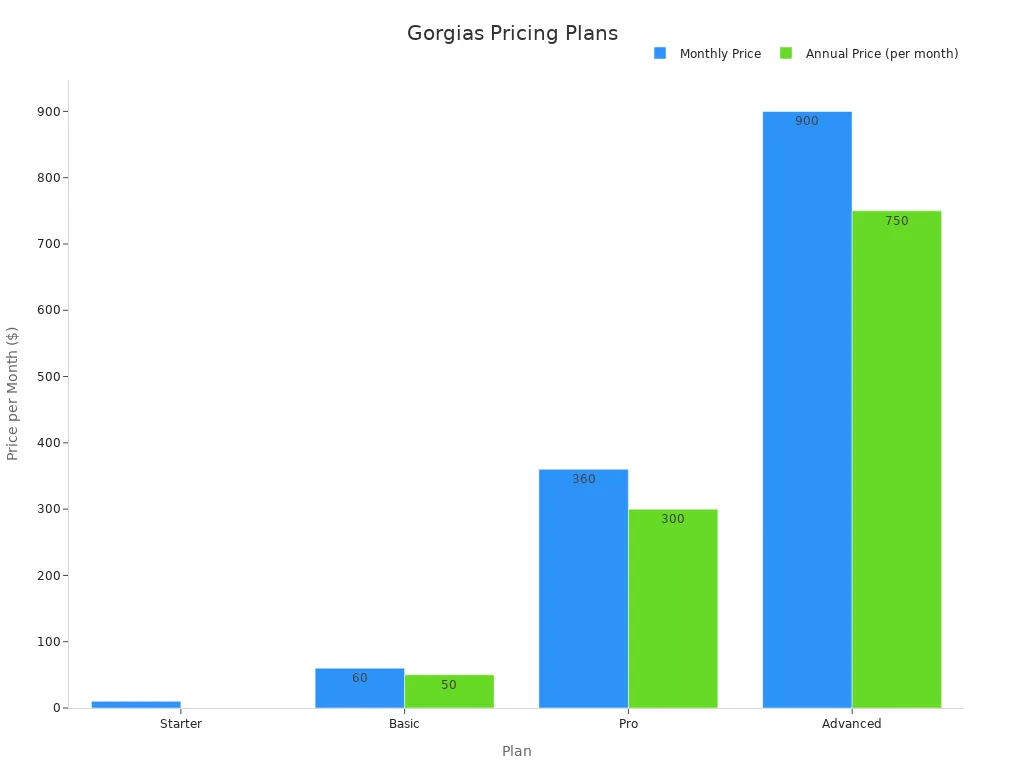
This omnichannel messaging software is a strong choice for e-commerce, but you must carefully consider the pricing structure. The cost for marketing automation and advanced messaging features can increase your monthly bill. This makes it important to forecast your ticket volume to choose the right plan for your personalized customer communication needs and avoid unexpected fees for real-time support across multiple communication channels.
4. Sobot
Sobot is a powerful all-in-one contact center solution designed for growing businesses. You can use this omnichannel messaging software to unify your customer communication across multiple communication channels. It helps you create a seamless experience for both your customers and your support team.
Key Features
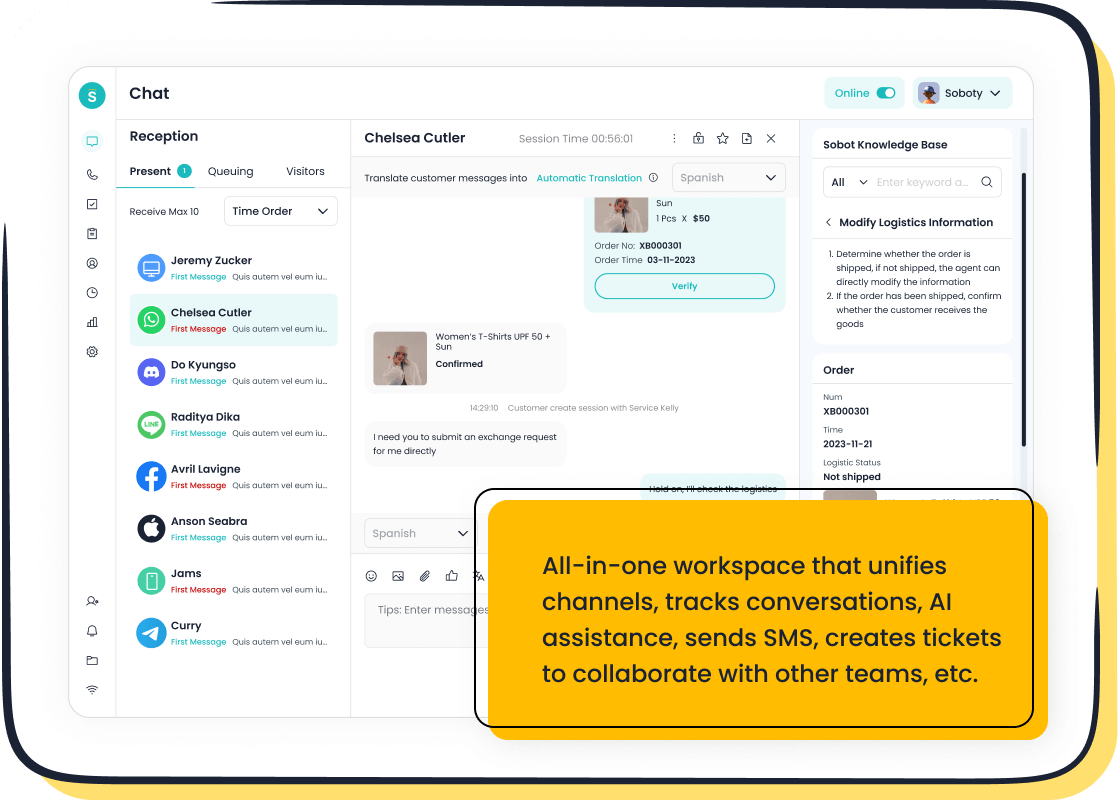
Sobot’s Live Chat product is a central feature, offering true omnichannel customer support. You can manage messaging from your website, app, WhatsApp, Facebook, and more, all in one place. The platform uses AI-powered customer messaging to boost efficiency.
- AI Agent: Learns from your knowledge base to provide accurate, human-like service.
- AI Copilot: Assists your live agents with reply suggestions and conversation summaries.
- Generative AI: Uses advanced models to make live chat and chatbots smarter.
Additionally, Sobot is a WhatsApp Select Tier Business Solution Provider. This recognition from Meta confirms its ability to provide reliable WhatsApp messaging and marketing automation for businesses.
Benefits
Using Sobot helps you improve efficiency and increase customer satisfaction. For example, the financial service platform Opay used Sobot to streamline its customer communication. This partnership resulted in their customer satisfaction score jumping to 90% and a 20% reduction in overall costs. This shows the real-world impact of effective AI-driven automation.
Key benefits you can expect: 📈
- Resolve up to 70% of inquiries with AI, freeing up your team.
- Provide around-the-clock customer support with AI agents.
- Integrate with tools like Shopify and Amazon for a unified workflow.
- Use personalized messaging to boost engagement and loyalty.
This omnichannel messaging software provides the tools for better real-time engagement and personalized customer communication.
Pricing
Sobot offers flexible pricing plans that scale with your business needs. This approach ensures that businesses of all sizes can find a suitable option. You can choose a plan based on your team size and the features you need for your marketing automation and messaging strategies.
| Plan | Price Range | Best For |
|---|---|---|
| Basic | Free - $150/month | Small businesses with straightforward needs |
| Mid-Market | $800 - $1,200/month | Growing businesses with moderate requirements |
| Enterprise | $3,000 - $10,000+/month | Large companies with advanced needs |
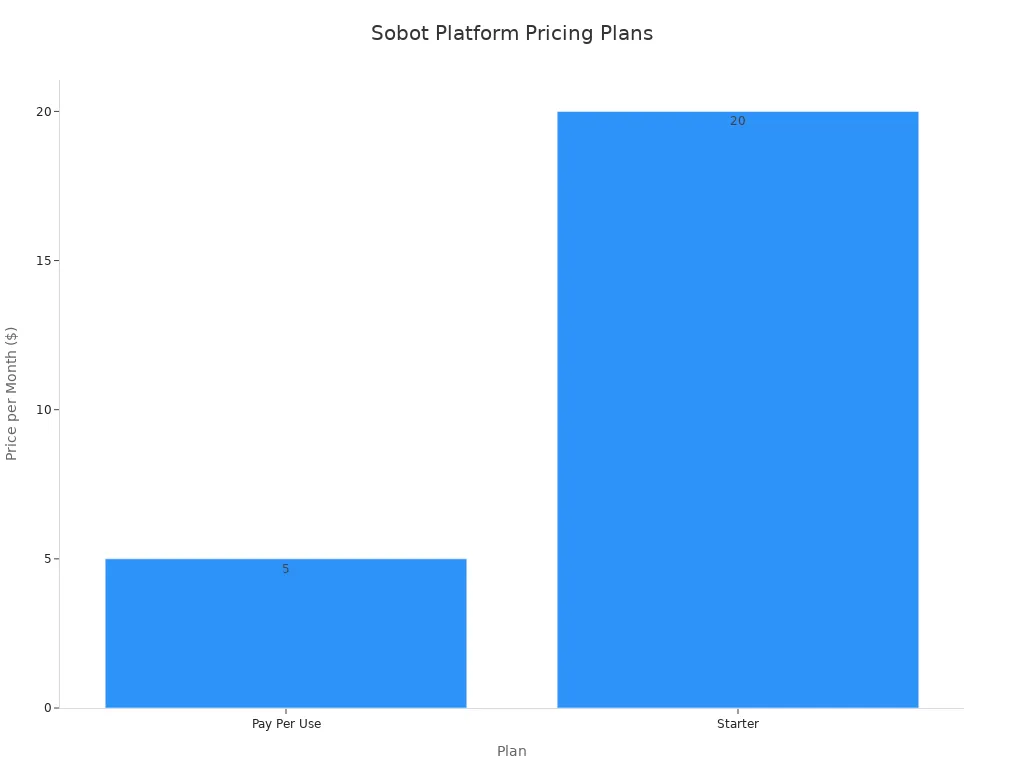
For a detailed quote tailored to your specific requirements, you should contact the Sobot sales team.
5. Freshdesk: An Affordable Omnichannel Messaging Software
Freshdesk offers an affordable omnichannel messaging software for businesses that want to unify their customer conversations. You can manage all your customer messaging from multiple communication channels in one place. This helps your team provide consistent and personalized support without a high price tag.
Key Features
Freshdesk provides powerful tools to improve your customer engagement. Its AI, named Freddy, helps you automate support and assist your live agents. This creates a better experience for both your customers and your team.
- Freddy AI Agent: This bot gives customers 24/7 support. It answers common questions and guides users to help articles for self-service.
- Freddy AI Copilot: You can use this tool to help your live agents. It suggests replies and summarizes ticket histories to improve real-time efficiency.
- No-Code Builder: You can build chatbots using a simple drag-and-drop tool. This allows you to deploy automated messaging across various channels like your website, WhatsApp, and Facebook Messenger.
- Sentiment Intelligence: The system detects customer emotions. This helps your agents provide more empathetic and personalized responses.
Pros & Cons
Pros:
- Affordable pricing plans suitable for small to mid-sized businesses.
- User-friendly interface that is easy to set up and use.
- Strong automation features to improve team productivity.
Cons:
- Advanced AI features often require purchasing add-ons.
- May lack some of the deep customization options found in more expensive platforms.
Pricing
Freshdesk offers several pricing plans for its omnichannel messaging software. The plans are designed to grow with your business, allowing you to add more features as you scale. You can choose between paying monthly or annually for a discount.
| Plan | Annual Price (per agent/month) | Monthly Price (per agent/month) |
|---|---|---|
| Growth Omnichannel | $29 | $35 |
| Pro Omnichannel | $69 | $83 |
| Enterprise Omnichannel | $109 | $125 |
Keep in mind that many of the advanced AI features are available as add-ons to these plans. This pricing structure allows businesses to start small and expand their capabilities over time across all their communication channels.
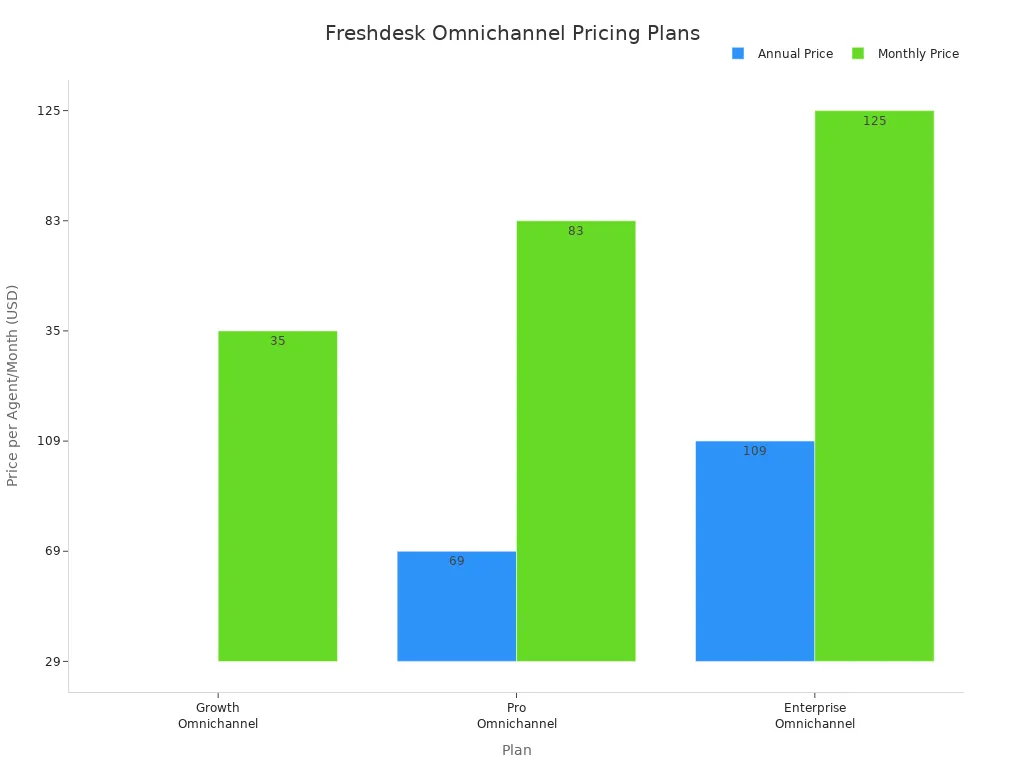
6. HubSpot Service Hub
HubSpot Service Hub is an omnichannel messaging software that works best for businesses already using the HubSpot CRM. You can connect it with your sales and marketing data for a complete view of the customer. This platform helps you manage customer messaging across multiple communication channels.
Key Features
HubSpot gives your team a unified help desk to manage all conversations. This AI-powered workspace brings your ticketing, data, and team collaboration into one place. It helps you provide better customer support.
- Omnichannel Support: You can manage customer interactions from various channels like email, social media, live chat, and phone calls. This ensures your team always has context.
- AI-Powered Tools: The platform includes chatbots for automated assistance and the Breeze AI Customer Agent for 24/7 support. These tools handle routine questions and update the CRM.
- Customer Success Features: You can track customer health scores, analyze sentiment, and manage feedback. This helps improve customer engagement and loyalty.
Pros & Cons
Pros:
- Seamless integration with the HubSpot CRM ecosystem.
- Powerful automation and reporting features.
- Scalable plans from free tools to enterprise-level solutions.
Cons:
- Can become expensive, especially at higher tiers.
- Professional and Enterprise plans require a significant one-time onboarding fee.
- Works best for businesses committed to the HubSpot platform.
Pricing
HubSpot offers several pricing tiers, including a free plan for individuals and small teams. The plans for growing businesses add more advanced features for automation and service analytics. This allows you to choose a plan that fits your current needs and budget for messaging.
| Plan | Monthly Price | Best for | Key Features |
|---|---|---|---|
| Free | $0 | Individuals & micro teams | Shared inbox, basic ticketing, live chat (with HubSpot branding) |
| Starter | $9/agent/month | Basic support needs | Limited automation, conversation routing, simple reporting |
| Professional | $90/agent/month | Scaling support teams | SLA management, knowledge base, multiple inboxes |
| Enterprise | $150/agent/month | Complex organizations | Custom objects, advanced bots, field-level permissions |

This omnichannel messaging software provides a robust solution for managing customer messaging across multiple communication channels. Be aware that the Professional and Enterprise plans also include mandatory one-time onboarding fees.
7. Tidio
Tidio is an omnichannel messaging software designed for small businesses and startups. You can use it to combine live chat and chatbots, creating a powerful tool for customer engagement. The platform helps you manage messaging from multiple communication channels in one simple dashboard.
Key Features
Tidio provides a hybrid model that blends AI automation with human support. Its Lyro AI chatbot can learn from your FAQs to provide instant, natural-sounding answers. This helps you handle common questions automatically.
- Multichannel Inbox: You can centralize all your customer messaging from live chat, email, Instagram, and Messenger into a single view.
- Lyro AI Chatbot: This conversational AI can resolve up to 70% of repetitive queries, freeing up your team for more complex issues.
- Visual Automation Builder: You can use a drag-and-drop editor to create automated workflows for lead capture and personalized greetings.
- Live Visitor Tracking: This feature allows you to see who is on your site in real-time and proactively start conversations.
Pros & Cons
Pros:
- Generous free plan makes it accessible for new businesses.
- Very user-friendly interface with an intuitive setup.
- Strong focus on live chat and chatbots for immediate support.
Cons:
- The free plan has Tidio branding and limited conversations.
- May not be as scalable for large enterprises with complex needs.
Pricing
Tidio offers several plans, including a free option that is great for businesses just starting out. As your needs grow, you can upgrade to paid plans for more features and higher conversation limits. This flexible pricing helps businesses scale their customer messaging efforts.
| Plan | Cost (per month, billed annually) | Key Features |
|---|---|---|
| Free | $0 | 50 live chat conversations, 100 chatbot visitors |
| Starter | $29 | 100 live chat conversations, basic analytics |
| Growth | $59 | 250 live chat conversations, removes Tidio branding |
| Plus | Starts at $749 | Customizable limits, dedicated support manager |
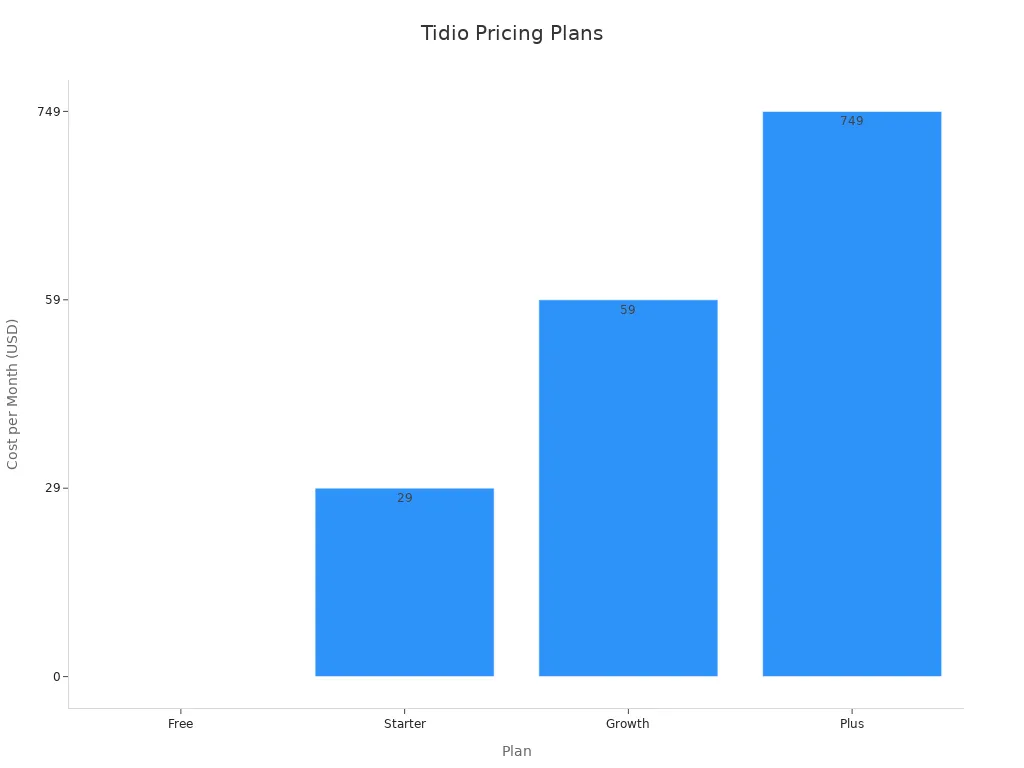
This omnichannel messaging software provides an affordable entry point for managing customer interactions across different channels.
8. Twilio Flex
Twilio Flex is a highly programmable omnichannel messaging software. You can use it to build a contact center that is completely tailored to your specific needs. This platform is ideal for businesses that require deep customization rather than an out-of-the-box solution. It gives you full control over your customer engagement strategy.
Key Features
Twilio Flex allows you to control every aspect of your customer messaging. You can modify the agent interface, conversation routing, and reporting to match your workflow. This level of control helps you manage interactions across multiple communication channels effectively.
- Programmable Channels: You can use built-in channels like Voice, SMS, and WhatsApp, or add custom channels such as in-app chat using APIs.
- Customizable UI: Every element of the user interface is adjustable. You can add new components for your live agents or create custom workflows with a drag-and-drop builder.
- Contextual Intelligence: The platform uses AI to understand customer needs better. Its Autopilot feature helps you build bots and IVRs for automated messaging.
- Broad Integrations: You can connect Flex with essential tools like Salesforce and Zendesk to give your live agents a complete view of the customer.
Pros & Cons
Pros:
- Extremely customizable to fit unique business processes.
- Scales to support businesses of any size.
- Offers powerful developer tools for building custom solutions.
Cons:
- Requires significant developer resources to set up and maintain.
- Pricing can be complex and implementation costs are high.
Pricing
Twilio Flex offers two main pricing models. Your choice depends on whether your team is full-time or seasonal. Both plans have separate usage fees for phone calls and messaging on different channels. This omnichannel messaging software provides flexibility for different types of businesses.
| Feature | Per-Hour Plan | Named User Plan |
|---|---|---|
| Base Cost | $1 per active user hour | $150 per user per month |
| Best For | Seasonal or part-time teams | Full-time, consistent teams |
| Budgeting | Variable and less predictable | Stable and predictable |
Both plans come with 5,000 free active user hours to help you get started. This allows you to test the platform before committing to a plan for your messaging across multiple communication channels.
9. Nextiva
An omnichannel messaging software like Nextiva unifies your business communications. You can manage voice, email, chat, and social media from one platform. This helps businesses create a consistent customer experience across multiple communication channels.
Key Features
Nextiva provides a complete set of tools for customer engagement. You can use its platform to manage all your customer messaging in one place. This makes your team more efficient.
- Unified Channels: The platform brings together various channels. You can manage social media messages from X and Facebook, group emails, and online reviews from sites like Amazon and Yelp in a single inbox.
- AI Capabilities: Nextiva uses AI to improve your messaging. It offers a generative AI knowledge base, automated conversation summaries, and language detection to help your agents.
- Automation & Routing: You can build chatbots with a drag-and-drop workflow engine. The system also uses intelligent routing to send conversations to the right agent based on their skills.
- Agent Tools: Agents get customizable dashboards with key performance indicators (KPIs). This provides them with insights to improve their performance.
Pros & Cons
Pros:
- Strong all-in-one solution for voice, video, and text messaging.
- Enterprise-grade security and reliability (PCI, SOC 2, HIPAA compliant).
- Scalable plans suitable for businesses of different sizes.
Cons:
- Advanced omnichannel features are only in higher-priced Enterprise plans.
- Can be more complex than simpler live chat tools.
Pricing
Nextiva offers a range of pricing plans for its omnichannel messaging software. The plans are designed to support businesses as they grow, from small teams to large contact centers. This allows you to choose a package that fits your budget and needs for managing messaging across multiple communication channels.
| Package | Price (billed annually) | Best for |
|---|---|---|
| Core | $15/user/month | Small businesses |
| Engage | $25/user/month | Higher call volume businesses |
| Enterprise Essential | Starting at $75/agent/month | High-volume contact centers |
| Enterprise Professional | Contact Sales | Omnichannel contact centers |
For the most advanced plans with full omnichannel features, you will need to contact their sales team for a custom quote.

The pricing structure allows you to start with basic features and add more capabilities as your business expands its use of different channels.
10. Front
Front is an omnichannel messaging software that acts as a collaborative hub for customer communication. You can use it to bring all your customer messaging into a shared inbox. This platform helps teams work together to manage conversations from multiple channels. It is a strong choice for businesses that prioritize teamwork in their support and engagement efforts.
Key Features
Front gives your team a single place to handle all customer messaging. This improves efficiency and ensures no message gets lost. The platform offers several tools to streamline your workflow.
- Omnichannel Inbox: You can consolidate messages from various channels like email, live chat, and social media. This creates a unified view for your team.
- Smart Workflows: The platform uses AI to automate tasks. You can route messaging to the right person, detect customer sentiment, and get real-time assistance for faster replies.
- Collaboration Tools: Your team can use internal comments right inside a conversation thread. This feature helps everyone stay aligned and track ownership of customer issues.
- Integrations: You can connect Front with over 100 other tools. This allows you to sync data from your CRM and other systems, giving you a full view of the customer.
Pros & Cons
Pros:
- Excellent for team collaboration with shared inboxes.
- Centralizes messaging from many channels.
- Powerful automation and integration capabilities.
Cons:
- Can be expensive for larger teams.
- May have a learning curve for new users.
Pricing
Front offers several pricing plans for businesses. The plans are designed to scale as your team grows. This omnichannel messaging software provides different tiers based on the features you need for your customer messaging.
| Plan | Price (per user/month, billed annually) |
|---|---|
| Starter | $19 |
| Growth | $59 |
| Scale | $99 |
| Premier | $229 |
These plans allow businesses to choose the right level of functionality for their communication needs.
How to Choose the Best Omnichannel Platform
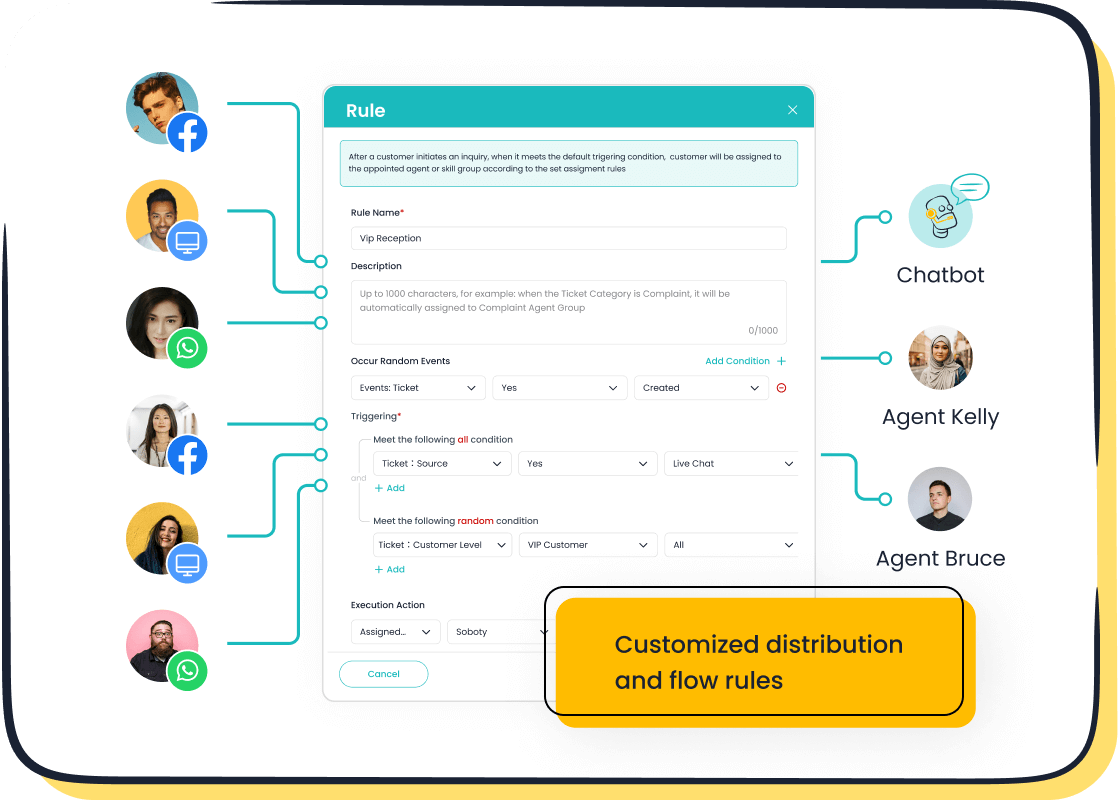
Choosing the best omnichannel platform requires careful thought. You need a solution that fits your team, customers, and budget. This guide will help you make a smart decision for your business. A good choice will improve your customer engagement and create a seamless customer experience.
Assess Your Communication Channels
First, you need to know where your customers are. An effective omnichannel messaging platform connects with you on the channels they already use. Make a list of all the touchpoints your customers use to interact with your business.
Your list of channels might include:
- Digital Channels: Website, mobile app, email, and social media like Facebook or Instagram.
- Messaging Channels: Live chat, chatbots, SMS, and WhatsApp.
- Traditional Channels: In-store visits and phone calls.
Understanding these channels helps you choose a customer messaging platform that can unify your messaging.
Evaluate Your Need for Different Customer Messaging Tools
Next, think about the specific customer messaging tools you need. Different tools help with different tasks. For example, live chat and chatbots offer instant support, while shared inboxes help teams collaborate on email and social media messages. Some omnichannel platforms focus on AI automation, while others excel at managing conversations. Evaluating your needs helps you find a customer experience platform that provides the right features for creating unified customer experiences and a better digital customer experience.
Consider Your Budget and Scalability
Your budget is a key factor. Pricing for omnichannel platforms can vary widely. Some offer free plans, while others have enterprise solutions that cost thousands per month. Look at plans that fit your current budget but also offer room to grow. Businesses should select a platform that can scale with them. This ensures you will not have to switch systems as your customer base expands. Your chosen solution should support your long-term goals for messaging.
Check for Key Integrations
Finally, check for important integrations. Your omnichannel messaging platform should connect with the other software you use. This creates truly unified customer experiences. Key integrations to look for include:
- CRM (Customer Relationship Management): To sync all customer data.
- E-commerce Platforms: For viewing order history and managing transactions.
- ERP (Enterprise Resource Planning): To connect inventory and order information.
Proper integrations ensure your team has all the information they need in one place, making your messaging more effective.
Selecting the right omnichannel messaging platform is vital for your business. It improves your customer experience and makes your team more efficient. The best omnichannel platform for your business depends on your industry, team size, and budget. Your choice of a customer messaging platform impacts your digital customer experience and overall customer engagement.
Final Tip 💡 Use the comparison table and the "How to Choose" guide as your final checklist. This will help you make a confident decision. An omnichannel platform for business like Sobot offers a complete customer experience platform with comprehensive messaging features for growing businesses across all channels. This ensures you can provide a seamless customer experience. Omnichannel platforms unify your messaging across all channels. Your customer messaging platform is key to success.
FAQ
What is an omnichannel messaging platform?
An omnichannel messaging platform unifies all your customer conversations. You can manage every interaction from channels like email, live chat, and social media in one place. This creates a seamless experience for your support team and improves your overall customer messaging strategy.
Why is omnichannel messaging important for my business?
Omnichannel messaging helps you meet customers on their preferred channels. This improves customer satisfaction and loyalty. A unified approach to messaging also makes your support team more efficient, as they have all the context they need in a single view.
How do I choose the right platform?
You should evaluate several key factors:
- Identify the communication channels your customers use most.
- Assess your need for tools like chatbots or AI automation.
- Consider your budget and the platform's ability to scale with your business.
- Ensure it integrates with your existing software, like your CRM.
Can I use these platforms for marketing?
Yes, many platforms support marketing automation. You can use them for proactive messaging to engage customers. For example, you can send targeted promotions or announcements through channels like WhatsApp or SMS, making your marketing messaging more effective.
See Also
Your Essential Guide to Omnichannel Call Center Software Solutions
Ten Steps for Successful Omnichannel Contact Center Implementation
Comparing Top Ten Live Chat Tools: Shopify and Its Rivals
Unlocking Shopify Success: Twelve Essential Live Chat Applications
